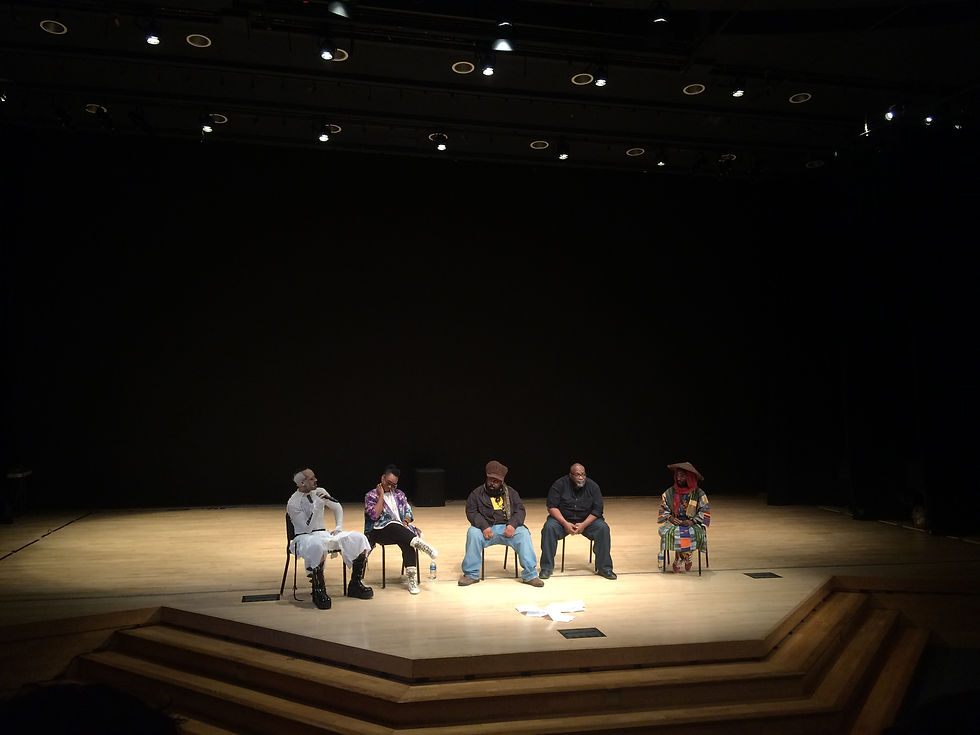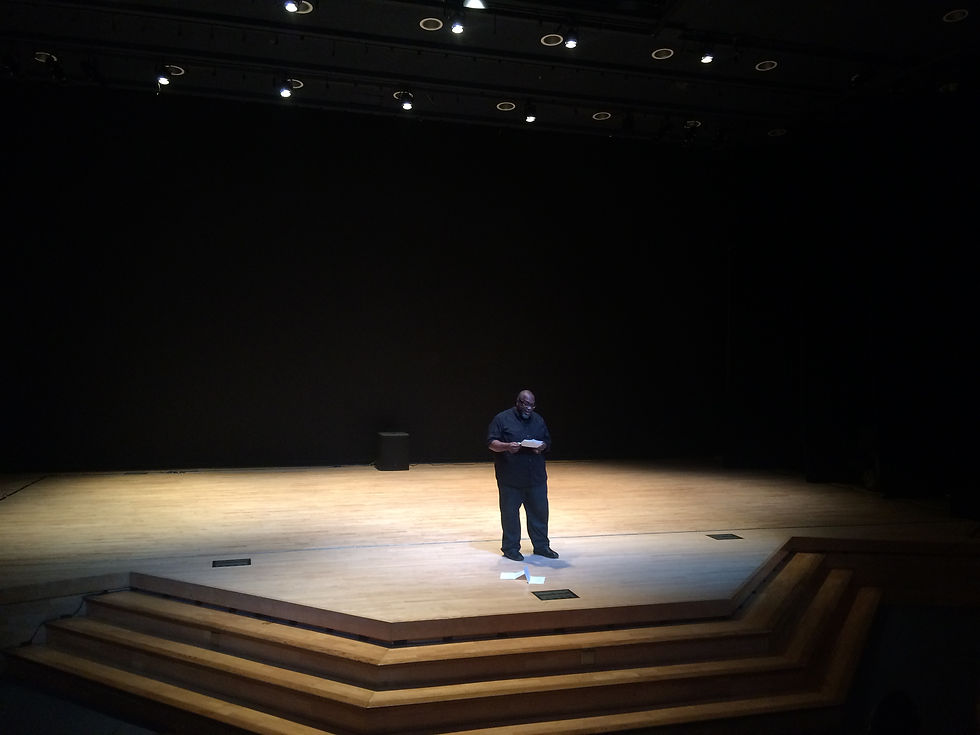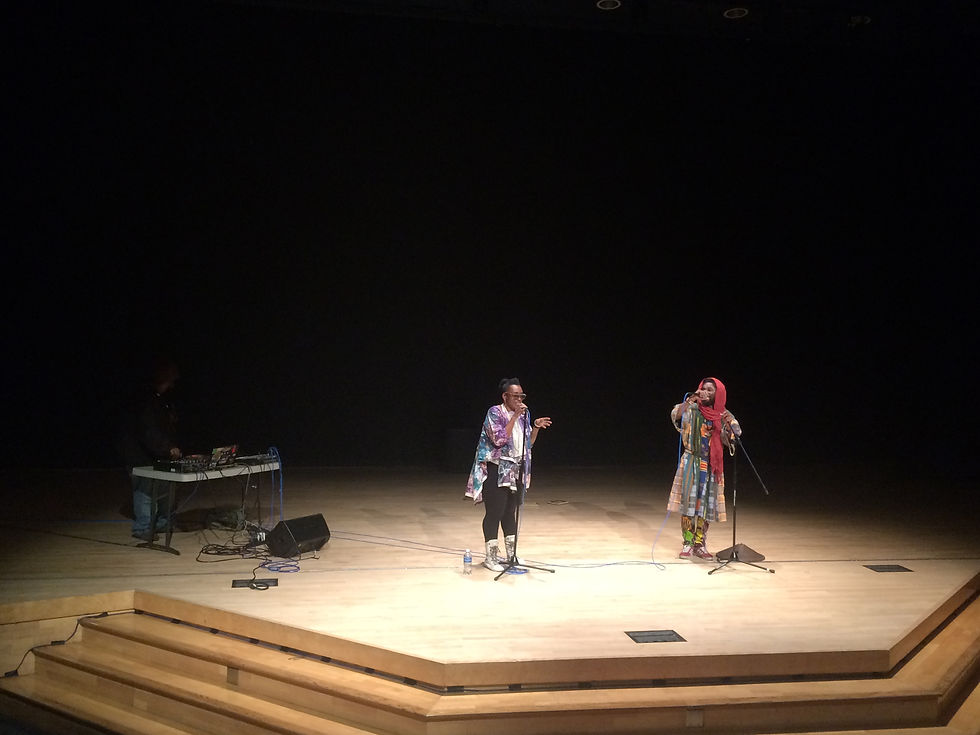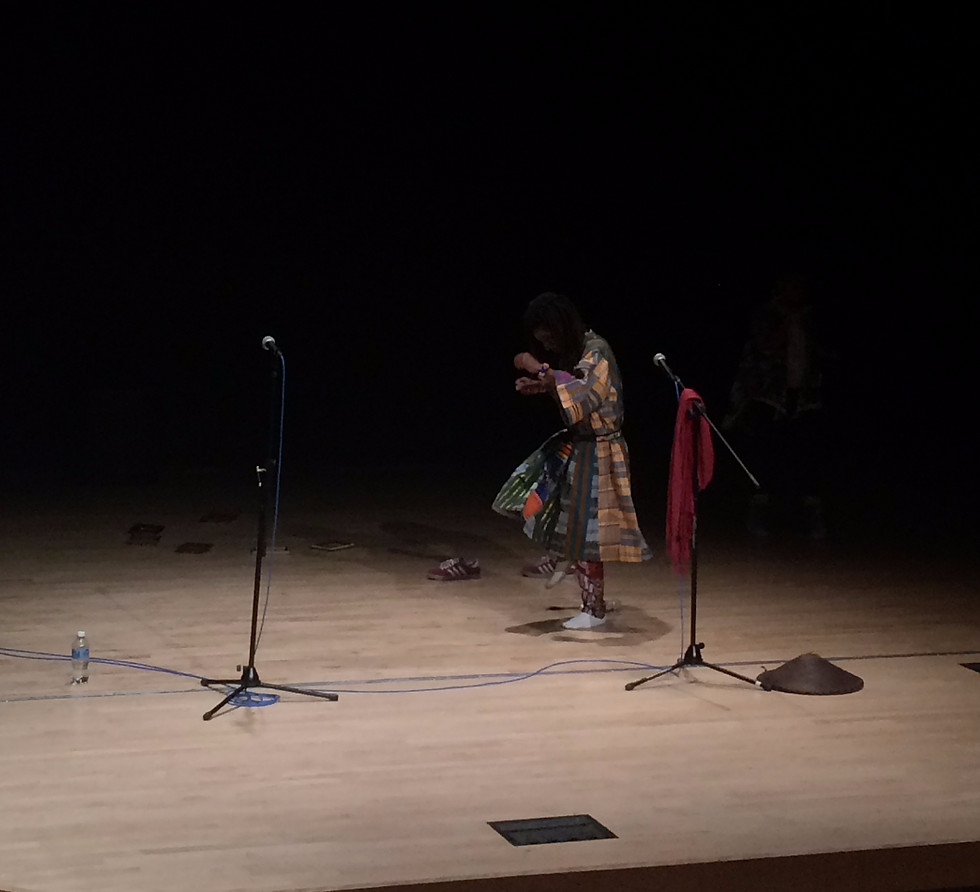A Festival of Moving and Grooving at UCI
- Emily Santiago-Molina
- Mar 14, 2016
- 4 min read

All Photos by: Emily Santiago-Molina
In the University of California, Irvine’s Winifred Smith Hall, the first performance of the night was ready to begin. At 8:40pm, the lights went dim and eerie music started to play. A distinct beat and static rang throughout the auditorium, accompanied by a medley of indistinguishable voices.
Dancer d. Sabela Grimes entered the auditorium unnoticed, coming from the back doors. He wore a white long-sleeved top and skirt over loose white pants, with chalk all over his face and hands. His performance consisted of a unique mixture of dancing, speaking, and singing. With his swift and purposeful movements, he held the audience’s attention. He spouted out words and lyrics profiling America, a country of spectators watching its “freak show” from a “front row seat”, he said.
He made the audience laugh by including “Yo Mama” jokes, to reference the plight of black women, identifying them as part of the twisted show Americans sit back and watch day to day.
As he performed, Grimes was making himself a part of the freak show, explaining how his people have been a part of the spectacle throughout the years. He brought attention to what came out of their struggles: their form of dance and speech, and he put them on display.
d. Sabela Grimes is currently an Assistant Professor of Practice at the University of Southern California, who has created “Funkamentals,” a new style of movement that incorporates cultural and spiritual aspects of the black community into their traditional dance forms, which he had just demonstrated.
Grimes’ contribution was only one of the contemporary performances that took place during this weekend at UCI’s Festival of Contemporary African American Culture organized by the Claire Trevor School of the Arts, to bring attention to the impact African American culture has made on today’s music and dance, in time for Black History Month. Friday, February 26th featured events circled around the topic of “Intersections between Asian American Jazz and African American Experimental Music” while Saturday the 27th featured “Hip Hop Invigoration.” Saturday’s events would show the fruits and benefits of the timeless relationship between Hip Hop and the African American community.
“We speak with the music. We’re speaking when we’re dancing and we’re dancing when we’re speaking,” poet and event speaker Fred Moten said in reference to Grimes’ routine.
Grimes had also conducted a dance workshop and lecture earlier at 2:00 pm, a precursor to the rest of the night’s events about the cultural development of hip-hop that began with African American youth.
Fred Moten shared his personal story about Hip Hop’s impact on his life, which filled up the seven pieces of paper he read from, letting each paper drop to the floor once he was done. Only for one moment did he look up from his papers for more than a few seconds. He rapped a verse from the song “I Know You Got Soul” from rapper Rakim, by heart. He claimed that hip-hop was the soundtrack of his adult life, representing a time where his people’s tradition came to life in song.

An English professor at the University of California, Riverside, Moten’s educational field is black studies, working on where performance, poetry and critical theory intersect with one another. He has also written books and poetry about Black tradition and experience. Motion was recognized by the Poetry Society of America as one of the “New American Poets” in 2009.
“Just keep on moving; we know this is our music. We know we’ve got hope if we keep on grooving,” he said as he dropped his last paper. A roar filled the room of about 140 people.
Deejayed by Los Angeles sound producer and curator, Ras_G, the following performance was loaded with diverse sounds and music. He is also Captain of the Afrikan Space Program, a prominent group on the LA scene of beat music.
Emceeing together was Eagle Nebula, a rhyming, rapping wordsmith from Inglewoood, California, and the colorful Kahill Sadiq, who has been featured as a fellow singer on Ras_G’s album. The music and their live rapping produced a high energy in the auditorium, with Moten leading the audience to stand and take part of their cultural party by dancing at their seats and simply swaying along with the unique sound flowing out of the stage speakers.

“We transfooooooorm…We transfooo-oorm” and other phrases were constantly repeated, either by the track or the emcees. If they weren’t singing or rapping, they were dancing around the stage or grooving behind their mic stands.
“We love your vibrations,” Nebula shared at the show’s end.
“How did we get to be so beautiful?” Moten had asked the council of performers earlier during an artist talk between shows.
Choreographer d. Sabela Grimes had re-entered, joined by his fellow guest performers, Ras_G, Nebula, and Sadiq.

Nebula described beauty’s connection with the growth of her people as inner promptings that had to be followed. “It’s the only thing that can’t be invaded because it’s inside of you,” she said. This event showed that Hip Hop was one of these promptings that guided the black community to be who they were meant to be.
Grimes shared his grandmother’s firm opinion on the history of black being beautiful. “Black and beautiful has always been synonymous,” she had said. Being a part of the movement of Hip Hop as creative beings was just another thing that made them beautiful.
Thinking about the event afterwards, Moten said the contemporary performance had brought him back to his younger days and how hip-hop was with him during the intellectual journey of his adulthood. Celebrating Hip Hop’s role in Black History was important to Moten since it had affected him personally and mentally.
“I remember when Black History Month was only Black History week,” he said chuckling. Times had changed but the reasons to celebrate the music’s influence had remained.
“Thinking’s supposed to make you move,” he said. “If we move more, we can think better.”




Comments